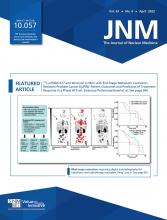On February 17, SNMMI released a second letter to the U.S. Centers for Medicare & Medicaid Services (CMS) in response to the January 11 proposed National Coverage Determination (NCD) decision memorandum that would cover U.S. Food and Drug Administration (FDA)–approved monoclonal antibodies that target β-amyloid for treatment of Alzheimer disease (AD) through coverage with evidence development (CED) (see J Nucl Med. 2022;63[3]:12N). In addition to indicating that FDA-approved drugs in this class would be covered only for people with Medicare who are enrolled in qualifying clinical trials, the NCD would have a number of potential negative effects for patients with or in the process of diagnosis for AD, according to the SNMMI letter.
After receiving initial comments from SNMMI experts, the society requested specific actions relative to coverage, including accompanying rationales:
(1) CMS should cover an amyloid PET scan before a patient is considered eligible for a CMS-approved study. Amyloid PET can identify ahead of time those patients who will not benefit from monoclonal antibodies and thereby simplify the enrollment process for patients and trial sponsors. It will also improve care for patients without β-amyloid, allowing treating professionals and caregivers to focus on treatment modalities that are appropriate for those patients. CMS should not limit coverage to trial participants but should provide coverage of amyloid PET to determine whether a patient should be enrolled in a trial.
(2) CMS should not finalize a limit of 1 β-amyloid PET scan per lifetime. No evidence currently suggests that a single amyloid PET scan per patient is appropriate or that an outdated scan can provide the diagnostic information needed to determine whether a patient is currently a candidate for therapy. Not only can β-amyloid status change over time, ongoing clinical trials for monoclonal antibody therapies for AD have used the results of posttreatment β-amyloid PET to inform decisions to discontinue monoclonal antibody therapy.
(3) CMS should require posttreatment β-amyloid PET to be performed as needed to document the removal of β-amyloid from the brain. CMS should allow as many PET scans as are needed to ensure that the trial design is optimal and reliable and provides physicians with the information needed to make informed decisions about initiating and continuing therapy. Notably, 1 or more scans must be covered during therapy to verify removal of amyloid.
(4) CMS should retire the current PET CED in conjunction with finalizing the monoclonal antibody NCD. Continuation of limitations on amyloid PET while other uses of PET for AD, such as tau PET, are covered at the discretion of the Medicare Administrative Contractors creates an illogical and confusing situation for physicians, patients, and clinical trial designers.
(5) CMS should not limit sites of service for approved clinical trials to hospitals. Limiting trials only to hospitals would greatly impede patient access because of geographic and payment considerations and would contribute to health care disparities.
In addition, SNMMI reiterated that appropriate reimbursement of amyloid PET agents is needed. Since 2008, CMS has packaged diagnostic radiopharmaceuticals (including the 3 amyloid agents) with the related PET scan in hospital outpatient settings. The packaging begins after the expiration of a passthrough period (about 3 years) during which drugs are paid separately. The result is a reimbursement rate of about 9% of the passthrough rate. Although CMS has the authority to fix this problem, it has resisted. SNMMI, the Medical Imaging & Technology Alliance, the Council on Radionuclides and Radiopharmaceuticals, and more than 70 supporting organizations are therefore pursuing legislative action through the Facilitating Nuclear Diagnostics (FIND) Act, a bipartisan and bicameral bill intended to unpackage these life-saving diagnostics.
In its summary, the latest SNMMI request recommended that CMS remove the coverage limitations on amyloid PET by retiring the NCD, by establishing that amyloid PET will be covered (before clinical trials) to identify patients who are candidates to receive monoclonal antibody therapy and as necessary after therapy initiation to inform treatment decisions, and by clarifying that there is no lifetime limit on the number of medically necessary amyloid PET scans that a patient can receive.
The January 11 CMS announcement of the proposed NCD and limited coverage of the drug included a 30-day period for public comment. After reviewing all comments received on the proposed determination, CMS is scheduled to announce its final decision by April 11.
SNMMI
- © 2022 by the Society of Nuclear Medicine and Molecular Imaging.







